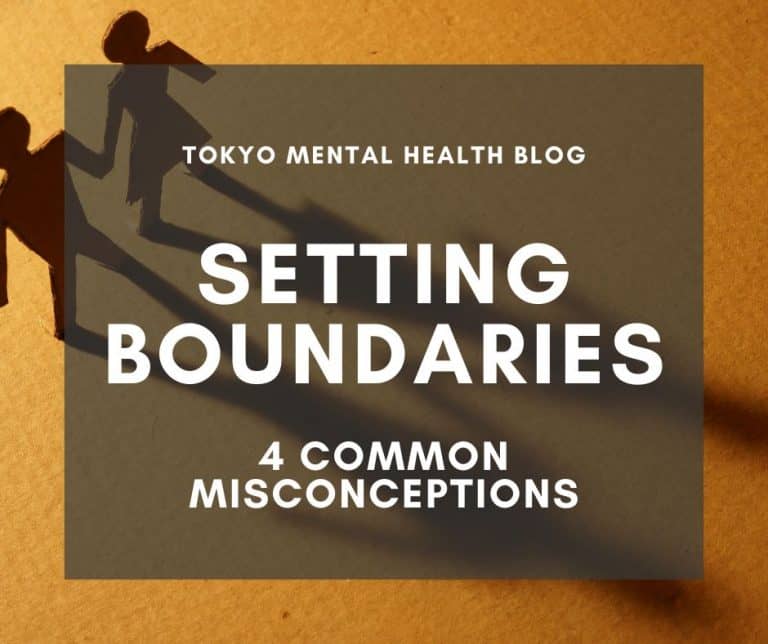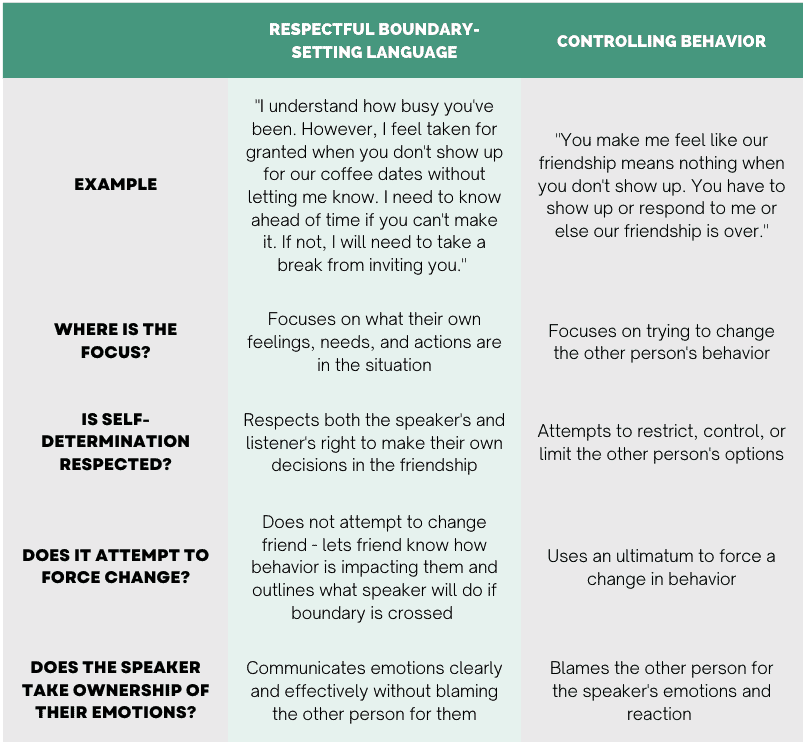- 2022/06/17
- Self Help & Tips

Imagine you have a friend who routinely cancels at the last minute, or doesn’t follow through on plans to meet up. Or perhaps you have a romantic partner who you love, but doesn’t always give you the time you need for friends or hobbies. Maybe you have a coworker who you go out with after work, but they never pay their share of the bill. If you are familiar with these scenarios, the feelings of discomfort or frustration that arise in these situations may be signaling to you that somebody has crossed one of your boundaries, or that you may need to establish one.
Boundaries are our personal limits that communicate what we will or will not tolerate in order to protect our well-being or the well-being of others. They apply to relationships of all kinds – familial, romantic, platonic, professional, and more – and enable us to feel safe, secure, and healthy in our interactions with others. Boundaries can pertain to every area of our life, including (but not limited to):
- The time and energy we give other people
- The type of physical contact we are comfortable with
- The kind of emotional topics we are willing to share or discuss with others
- The way we allow others to handle our material possessions
- How we handle others asking for or borrowing money
- How often or in what way we want to communicate
According to Tokyo Mental Health psychologist Shahroze Suzuki, “We all set boundaries in our daily life whether we know it or not. Not replying to an email at night, not answering a call after hours, or taking a day off due to illness are all examples of common boundary setting – we set it and clarify our stance assertively and in a non-confrontational way.”
Because our boundaries are shaped by our culture, personal experiences, personality, beliefs, and family background, the boundaries people set can vary widely. For example, a friend who grew up in a family where expressing physical affection like hugging was common may not realize they are crossing the physical boundaries of friends who are uncomfortable with this kind of contact.
As a result, learning how to communicate boundaries is a crucial skill in maintaining healthy relationships of all kinds. However, communicating, navigating, and respecting our boundaries and the boundaries of others can be a complex process. As a result, we’ve compiled a list of common misconceptions to help demystify some of the most difficult aspects of boundary-setting.
Misconception #1: If somebody sets a boundary with me, that means they are pushing me away.
According to Tokyo Mental Health counselor Rubendev Singh Dhillon, “Boundaries are commonly misinterpreted. Often, for the person setting them, boundaries appear as closing the door against another person.” When somebody sets a boundary with you, it is ok to have feelings about it. It can be difficult to hear that our behaviors have negatively impacted those close to us, and that part of your relationship may change. However, it is important to keep in mind that the person who communicated their boundaries cared enough about the relationship to be honest about how they feel and what they need.
Learning about a person’s boundaries provides us with an opportunity to understand that person better, and to learn what they need to feel healthy, happy, and secure in the relationship. As a result, actively supporting and respecting the boundaries of those around us gives us the opportunity to strengthen our relationships and promote the well-being of those we care about. As Suzuki puts it, “Boundary setting can help people function without stepping on others’ toes so that a healthy mutual understanding may develop and, as a result, relationships then may flourish.”
Though it can be easy to feel pushed away when somebody sets a boundary with us, it is important to avoid behaviors like passive-aggressiveness, lashing out, or inflicting guilt on the person who set the boundary. Doing so may make the person feel disrespected or manipulated out of their boundaries. Always keep in mind that your relationship mattered enough to the other person that they went through the effort of communicating their boundaries in an attempt to preserve your relationship, rather than let it dissolve.
Misconception #2: Setting boundaries is aggressive, selfish, or something I need to be apologetic for.
“People fear what others might think of them if they set boundaries. We might predict that others will think of us as being rude or self-centered,” says Dhillon. Saying “no” to those we care about may be difficult, especially if you were taught to always say “yes.”
Not setting proper boundaries, however, can leave us feeling stressed, unappreciated, or resentful. “One common misconception about boundary setting is that it might lead to confrontation and as a result, damage relationships. On the contrary, I feel relationships often end up being toxic because certain boundaries end up broken or not respected,” according to Suzuki.
Without establishing healthy boundaries, you may allow others to treat you in ways that are hurtful or unhealthy for you, which may lead to greater problems within the relationship, lower self-esteem, or feeling mentally, emotionally, or financially burdened. You may neglect yourself in favor of meeting the needs of the other person, or suppress your emotions in order to avoid conflict out of fear of damaging the relationship.
Conversely, setting boundaries enables us to take proactive steps to protect our mental, physical, and emotional health. This, in turn, allows us to be better friends, partners, coworkers, and family members. Boundaries help us create safe, healthy environments for relationships in which closeness and connection can flourish, and the needs of each person are heard and respected.
As a result, setting a healthy boundary should not require an apology or justification, which may make it seem like the boundary you are setting is optional or subject to the approval of the other person. Others interested in maintaining a healthy relationship with you should support and respect your boundaries when you establish them. It is also important to remember that you are only responsible for communicating your boundary with respect, and not for another person’s response to it.
Misconception #3: I do not need to set boundaries with the people I love and are closest to me.
Because of the COVID-19 pandemic, many of us are living and working in closer quarters with family, friends, or coworkers than we were before. As a result, you may have found yourself in a position where you’ve needed to discuss boundaries with a loved one. Though it can be tempting to think that boundaries are not necessary with those who love and know us best, failing to communicate and enforce healthy boundaries in these relationships can leave us vulnerable to issues like enmeshment and codependency.
However, it is worth noting that what is considered a “healthy” boundary between children, parents, or other loved ones can vary from culture to culture, and can also be affected by issues like facing systemic discrimination or violence in society. As a result, it is important to take the cultural context, beliefs, and norms of the people involved into account when thinking about concepts like enmeshment and codependency.
Enmeshment refers to when the boundaries between two people (usually family) are blurry and unclear to the extent that it affects each person’s independent functioning. In families, this can mean that the boundaries between parents and children are confused, which can result in parents that are reliant on their children for emotional support (sometimes resulting in “parentified” children) or children who struggle to establish an identity and sense of self outside of their family.
A lack of boundaries in close relationships can also result in codependent relationships. These are characterized by an imbalanced or one-sided dynamic where one person assumes responsibility for the emotions or actions of the other person, often at the expense of themselves. As a result, the person they try to “fix” may also become reliant on them. Addressing codependency can include learning to set and enforce proper boundaries that enable you to no longer feel responsible for the emotions and actions of another and learning to set limits on how and when you are willing to help.
Misconception #4: Setting boundaries is about trying to control another person.
Setting personal boundaries entails identifying and communicating what our personal limits are, and how we will respond when those boundaries are not respected. In this way, boundaries empower us to take responsibility for our own emotions and actions in response to a situation. They do not attempt to control the actions of another person, but allow others to make their own decisions with the knowledge of how those decisions affect you and how you will respond in turn.
Suppose you have a friend who struggles with time management and routinely over-commits or overbooks themselves. As a result, they often cancel plans with you at the last minute, show up late to important events, or forget to follow through at all. As a result, even if you understand, you may wish to communicate to your friend how their actions are impacting you and your friendship.
Below are two examples – one demonstrates an attempt at respectfully setting a boundary, while the other shows what controlling language looks like in this situation.

The speaker who is attempting to set a healthy boundary focuses on themselves and what they will do in a given situation, rather than telling the other person what to do. They do not attempt to limit the options of the other person in the situation, or force change through using demands or ultimatums. Lastly, the speaker takes responsibility for their own emotions, and does not attempt to blame the other person for them.
Learning how to identify, set, and enforce personal boundaries is an important tool in maintaining relationships of all sorts. However, in some circumstances, seeking additional emotional and professional help may also be necessary, particularly if you are concerned you are in a codependent or abusive relationship. Please feel free to contact us or book an appointment if you need additional support in navigating boundary-setting or other relationship issues.
If your situation is dangerous and you are facing abuse at home, you can visit the Domestic Violence Hotline website, where you can chat in English, Chinese, Korean, Indonesian, Spanish, Portuguese, Tagalog, Thai and Vietnamese (phone calls and emails are offered in Japanese only).